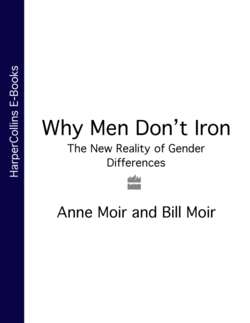Читать книгу Why Men Don’t Iron: The New Reality of Gender Differences - Anne Moir - Страница 11
Males need protein more than females
ОглавлениеCanadian endurance athletes, both men and women, were put through a series of persistent and gruelling exercises.17 It was discovered that the women needed to increase their protein intake by about one-seventh, but the men needed to nearly double it. Regular exercise increases the need for protein much more sharply in a man than in a woman.18
Exercise produces muscle, and the manufacture of muscle demands protein. The reason a man needs more than a woman is not just because he typically has more muscle, but because of his androgen hormones – the most common of these being testosterone. Androgens are made by both sexes, though in far greater quantity by the male (over ten times the amount after puberty), and they are responsible for the development of such male characteristics as facial and chest hair, baldness, the deep voice, increased libido, and greater aggression. A higher androgen level means a higher rate of protein synthesis (requiring, of course, a higher intake of protein). Men make protein faster than women, they use it faster than women, they need more than women.
Protein
Proteins are an essential part of every cell in the body, and they consist of 20 or so amino acids, eight of which are crucial to our nutrition. Proteins are continually broken down and resynthesized – the average adult reprocesses about half a pound (250 grams) each day – but in that process some protein is lost and needs to be replenished from our diet. We need about 2.5 ounces (70 grams) to do this. Proteins should form 10–15 per cent – one part in seven – of our daily diet.
The body of the average adult man contains between 25 and 30 pounds of protein, of which only 12 ounces (340 grams) is held in reserve. This slender margin means his body (and hers) is reliant on new protein from food. Protein lost through prolonged fasting, or because of an inadequate diet, can result in the wasting of body protein, and when that protein is drawn from the heart muscles the loss is irreplaceable and life-threatening. Children on an inadequate protein diet are often stunted and show poor mental development.
Animal protein is the best available source for humans. Without it, care must be taken to balance the food one eats to compensate for the consequent deficiencies.
Meat is usually 17–20 per cent protein; egg, 12 per cent; cereals, 10 per cent; milk, 3 per cent; potatoes and French beans, 2 per cent; carrots and lettuce, 1 per cent.
Dutch scientists recently examined older adults to see how quickly they used up protein. Even when corrections were made for differences in body composition, it was found that ‘protein turnover rates were significantly higher for men when compared with women.’19 It was also found that protein requirements do not drop with age, but may even increase.20 Indeed, protein deficiency is the major nutritional problem of the elderly female.21
Another research paper reported that elderly people’s intake of high quality protein needs to be twice the current recommendation.22 However, the authors refer only to milk and eggs as ‘high quality protein’. There is no meat in their recommended diet. But ‘high quality protein’ has long had a specific meaning in nutrition circles: it refers to those animal products that have an amino acid balance that is closest to human needs. (Amino acids are the building-blocks of proteins, so to make protein you need the right amino acids in your food.) Some vegetables have a similar protein quantity to meats, but they do not have the quality amino acid balance. Vegetarians, who eat intermediate or low quality protein, may need twice the protein intake of non-vegetarians to provide themselves with the adequate amino acids.23
‘Didn’t I hear of a vegetarian body-builder who recently won a contest in south-east England?’ asks Anne.
‘A one in 10,000 exception among muscle-men,’ says Bill. ‘Were it one in 20 we might take note.’
High quality proteins are, in order of merit: meat, fish, eggs and milk. Meat is by far the most efficient provider of protein, containing five times more than milk. Egg protein used to be the reference point for human needs; its amino acid balance is now found to be perfect for a chicken but not for a human, for whom lean meat or fresh fish is closer to the ideal.24 We need protein, men need it more than women, and meat is the ideal source.
